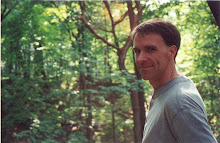
Afterwards, we went for coffee in the old Haymarket Section on the west edge of town, where the old train station and warehouses have been converted into bars and upscale shops, some named for their former uses: The Apothecary, The Creamery, The Mill, etc. There was also the From Nebraska Store, specializing in corn and football mementoes. The neighboring upscale bars and thumpy nightclubs looked like a college kid's dream, a resident's nightmare.
"If you go down to the Haymarket," Pat had said in front of Room in New York "with all the windows, and the sun setting, it's like a Hopper painting. The light is always great: reddish and orangeish. And the shadows are perfect."
Just past the buildings, a broad swath of railroad tracks cut into the prairie. In the rail yard that evening was a benefit for juvenile diabetes, and I stopped to talk to a woman working the gate who had moved back here from San Francisco. She was a solid woman with impenetrable brown eyes who wore shorts and a half-button collared shirt. "We leave," she said, "but we all come back. The people here are generous," she said when I asked how the event was going, and, as if to prove her right, a woman walked in front of me and dropped money into the bucket without entering. The older men we passed all looked like the frumpy 1970s wine-hawkers Bartles and Jaymes. And everybody looked like a football player, even the women.  In the bathroom of the coffee shop, I read on the wall: "In the darkness, ugliness goes away, but fat stays."
In the bathroom of the coffee shop, I read on the wall: "In the darkness, ugliness goes away, but fat stays."
Night fell, making this neighborhood into a Hopper painting, as Pat had promised.
We followed up our after-dinner coffee with drinks downtown at a bar on O Street, the strip of bars catering usually to the university students. Though it seems a cliché, Lincoln was so sleepy as we walked through the downtown that I heard crickets. We passed a series of old business buildings that looked like they came right out of a Hopper painting: arched windows set into great stone blocks etched with archetypal names like "Security Mutual Life"  and "Federal Trust," Art Deco movie palaces, anonymous diners, etc.
and "Federal Trust," Art Deco movie palaces, anonymous diners, etc.
One round led to another as we got to know each other. But by now I was no longer taking notes for the book. I felt that they, like me, were loath to leave the company of like-minded people. Spending so much time on the road had estranged me from my former world. I was isolated like the characters in Hopper's paintings. And no matter how much a connection I felt that night with Rachel and Pat, I had to move on the next day. I was making one-night friends in many of the towns I visited, but I found myself longing for continuity, community.
20090316
184 Lincoln, NE: In The Dark
Subscribe to:
Post Comments (Atom)




No comments:
Post a Comment